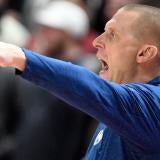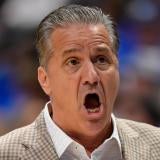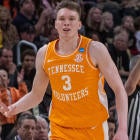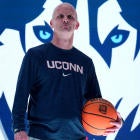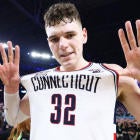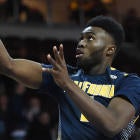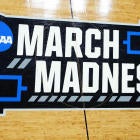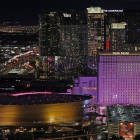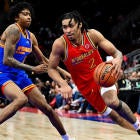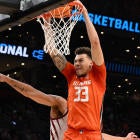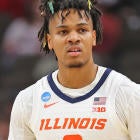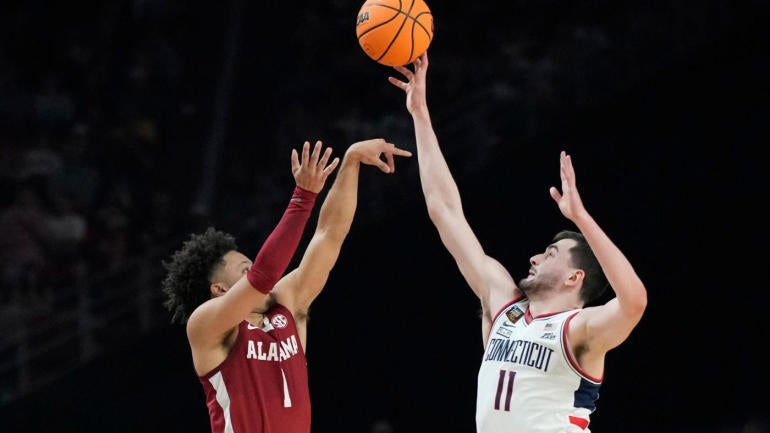
"Exciting" would not be the word we'd use to describe the upcoming 2024 NBA Draft.
Unlike recent years, the 2024 draft lacks elite players and compelling storylines to keep fans engaged (Sorry, Rich Paul). This makes it easy for basketball lovers to tune out the mundane coverage of this subpar draft. However, in doing so, they miss nuanced decisions that point to a seismic shift on the horizon in college basketball.
On May 29, the NBA Draft withdrawal deadline came and went. As expected, players who heard less than favorable responses about their NBA standings decided to return to college. Notably, several promising second-round picks also chose to either return to their schools or enter the college basketball transfer portal instead of beginning their NBA career.
Players like Alex Karaban (UConn), Hunter Sillas (Wake Forest) and Mark Sears (Alabama) decided stay in school. Although this may seem like a small footnote in a lackluster draft process, it actually signifies a new normal in college basketball.
Historically, college prospects would cash in on their professional potential as soon as possible, aiming for the biggest payday, an earlier shot at a second contract and of course an extra year of career earnings. A draft like this one would have been ideal for non-obvious NBA players to just go ahead and make the most of their stock. However, thanks to evolving Name, Image, and Likeness (NIL) laws, a second-round promise is no longer enough to lure college stars away from the comforts of college life.
Seattle was the epicenter of this revelation. During the 2024 NBA Draft combine, news broke that former Utah State star Great Osobor would suit up for the Washington Huskies next year after negotiating a $2 million NIL payday. With a multitude of stay-or-go decisions still on the table at the time, the heavy rumble of Osobor's fully loaded Brinks truck swept through Chicago, site of the combine.
"That's a crazy number," projected late-second-round pick Jaylen Wells told 247Sports' Isaac Trotter. "Not going to say a specific number, but my NIL wasn't close to that. But coming from Division II, not having a full scholarship, paying for college and two years later, you see guys with two million playing in college? It's crazy to think about."
Although Wells opted to stay in the draft, Osobor's deal certainly had other fringe NBA prospects rethinking their options.
Sears needed to hear an NBA front office tell him that he was guaranteed a roster slot for him to stay in the draft because of how much money there is to be made at the college ranks.
"Basically, if a team has a guaranteed spot for me," Sears told Trotter. He explained how NIL money creates financial stability for players not necessarily seeking NBA stardom. "Some players have a dream of playing in the NBA. That may be their main goal. Others love the college life and may not be ready to leave. It's never a bad position to be in."
While few players will pull in the unprecedented $2 million deal that Osobor was able to broker, needle-moving college players could still earn more than the non-guaranteed $559,782 that the NBA is offering for two-way contracts by staying in school. This financial reality is creating a divide between college basketball and the NBA. NCAA conferences are no longer mere stepping stones to professional leagues; they can now retain their stars and compete for elite talent.
This is a new, welcome era for college basketball, which has had to push away competition like the now-defunct G League Ignite, Australia's NBL and Overtime Elite. As NCAA basketball evolves with a revenue-sharing model, on top of NIL perks, it may start to resemble leagues like the NBL or the EuroLeague, transforming into an international game with broad appeal. Don't be surprised when you see blue blood schools with deep pockets, like Kentucky, playing a broader international schedule in hopes of expanding their overseas market (they might even interrupt conference play for an international trip just to get more eyes on the game). Or, when the next Luka Doncic does a year at UCLA (because we all know how Mick Cronin feels about a good international prospect).
And don't get beside yourself when seven-figure paydays become the norm in college basketball -- even for players you've never heard of.
For the first time in the NBA's modern era, it's now legally more profitable to be a college basketball star than a fringe NBA benchwarmer.






